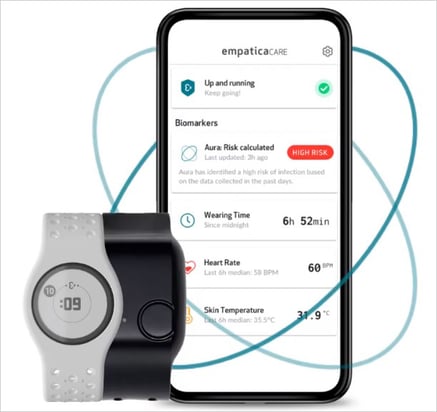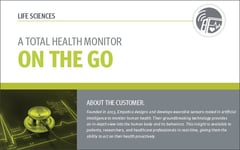There is nothing artificial about this intelligence.

With concerns about data privacy, a good number of the population is hesitant about sharing more information about themselves. It’s always a fair concern, but when thinking about the possibilities with machine learning and AI in wellness tracking, exceptions may be worthwhile.
Through the progress of AI and machine learning, overall personal and individual health is improving. Wearables are becoming smarter and more powerful. Designers like Empatica are focusing their energy on developing their smart software. This has resulted in their wearable EmbracePlus to be selected by the U.S. Army Medical Research and Development Command (USAMRDC) to be developed to detect pre-symptomatic signs of COVID-19. This is achieved through Empatica’s algorithm, Aura.
The Algorithm is Gonna Get You
Aura was developed to detect respiratory infections through a wearable platform. It calculates the output from the person wearing the device and alerts the user (and their caregiver) when something is amiss. The goal was, of course, to treat the virus before it could do more harm to the person and to prevent spreading it.

Source: https://www.empatica.com/en-eu/aura/
This is only one of the features of this smartwatch can detect through machine learning. The breadth of the scope is impressive. They are making huge breakthroughs in neurological disorders including strokes, Parkinson's, Alzheimer’s, Multiple Sclerosis (MS), and epilepsy. Imagine getting a warning before having a seizure? If you are driving a car, and you have the time to pull over…it will save your life.
Complete Coverage for the Entire Body
Smart watches and wearable patient monitoring systems track many sensors and digital biomarkers. This can include electrodermal activity (EDA), pulse rate variability (PRV), inter-beat interval (IBI), steps, rest, advanced optical PPG (Photoplethysmogram), and much more.
What’s really important to consider here is that without a simple and (let’s be honest) stylish device, this will not get done. Anyone who has tracked calories on a diet knows that it is a pain, and no one wants to do it. To take that to the next level, imagine being assigned by a doctor to manually log erratic symptoms on paper. The collected data will never be fully accurate or objective. It will have holes, and it will be questionable. Smart watches don’t have opinions and they never forget. They simply detect patterns and report back to headquarters while the wearer lives their life uninterrupted.
The Benefits of Health Tracking through AI and Machine Learning
The benefits that follow, you know besides saving lives, are significant. With health data consistently being traced and tracked, doctors can make better decisions. There are times when patients don’t know what is valuable to share or times when they have simply forgotten symptoms they have felt. While the dialogue between a doctor and patient will always be there, the unsaid can now be heard too.
With all of this in mind, the cost of healthcare also drops when one can act proactively. By using this crystal ball of artificial intelligence, unnecessary procedures and medications can be avoided. Problems can potentially be managed before they become big problems avoiding those costs as well.
These days it is common to hear 'data is the new oil'. Living through the 4th Industrial Revolution, this has proven to be true. The question is, why should that be limited to industry, when people matter so much more?
To learn more about automated test and measurement systems, please contact Averna.
You may also be interested in…
Want to learn how Averna helped accelerate production for Empatica’s EmbracePlus? Read the case study!
Get in touch with our experts or navigate through our resource center.
